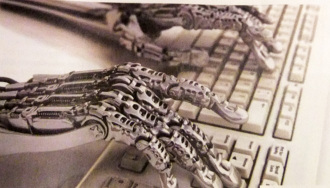In all the furor over the impacts of artificial intelligence and robotics, the term “artificial general intelligence” (AGI) gets tossed around a lot.

Hidden within those three words is a very powerful and potentially threatening concept. According to many experts it will soon be controlling what you do, what you know, and how you live your life. So what does it mean?
AI versus AGI?
Most of us are familiar with the concept of Artificial Intelligence or AI. We have seen it in the news ever since the IBM computer Deep Blue beat the reigning world chess champion Gary Kasparov in 1997. AI was going to revolutionize the world and allow people to live better lives. All it would take is a few more tweaks to the software and AIs would become our powerful servants.
But what we discovered was that the AI programs were very specialized. Sure a Deep Blue was a whiz at chess, but it depended on highly customized hardware and software to do its job. So it was really not very good at doing anything else. It was an Artificial Intelligence – but it was not very general.
What followed over the course of the 1990s and the 2000s was a collection of these very specialized systems – each one could do something that we thought required human intelligence, but each one could only do one thing. Not one thing at a time – but only one thing. A far cry from what we think of as intelligence. They were more like an idiot savant, we needed something more like a generally smart person. Something that could help us with our taxes, then help Sally with her homework. Something that could help plan the meals for next week, and then remind us about the presentation due at work on Tuesday. Something that was both intelligent and flexible – an Artificial General Intelligence.
Risk and Control
On the surface this sounds ideal. A generally intelligent servant that we can rely on to make our lives better. But there are risks. The biggest risk with an AGI comes from the very thing we want – flexibility. Think about it. Let’s say that after defeating Gary Kasparov, the Deep Blue computer wanted to do something else, play the stock market, or open a convenience store. It is stuck. All it can do is evaluate chess positions and propose a great move. Not only does it not ‘know’ anything about the stock market – it doesn’t even have the ability to learn anything about the stock market.
With an AGI that limit goes away. An AGI has to be able to adapt to new things, it has to be able to learn on its own, and it really needs to have the ability to set its own goals if it is going to make your life better. When the new tax code comes out it has to learn about the changes if it is going to help with the taxes. When Sally moves on to 4th grade, the AGI will have to learn new subjects to be able to help with her homework. If a competitor just announced a breakthrough, it needs to know about it and assess the impact on your big presentation on Tuesday, so that you don’t get caught flat footed in the meeting.
All of those capabilities are powerful, flexible, and risky. Artificial General Intelligence could become a servant that ends up running the household, controlling your life “to make you happy,” but controlling your life none the less. When we look back at history we see many examples of situations where what started out as a beneficial, helpful system soon became a controlling system. Some were governments some were simply households where the servants became the masters.

And you have to ask yourself – is that what you want your life to look like?
Next up – “Building our own worst nightmare”

